Feature Articles - Munich
A Sinking Ship
In 1916 the cracks in Munich's desire to persecute total war were becoming deeper and wider. In the eyes of most people the rationing went from acceptable to stringent, to punitive. Beer, bread, milk, coffee, tea, potatoes and meat were delivered in smaller and smaller portions. Among the poor the signs of malnutrition were starting to show.
One of the last straws for Bavarians on the home front came when the Imperial War Ministry seized and melted down one of Munich cathedral's great bells for the war effort. For a state that was so proud of its history and Catholic heritage, their loss was seen as another example of Prussia taking all that it could from Bavaria to persecute what was increasingly seen as its war.
Leaders who called for a sweeping away of the old order began to find a new and attentive audience. Most of these radicals came from, or were affiliated to, the USPD, the Independent Socialist Party. Frustrated with the SPD's continuing support of the war, in 1917 they had formed a splinter group that was far more vocal in its call for peace and reforms.
Even further to the left of the USPD were a group of shadowy figures that produced calls for a Marxist 'solution'. They were called the Spartakusbund - the Spartacus Union - named after 'Spartacus', the signatory of their declarations and revolutionary flyers. The Spartacist's message was popular in Germany's large Proletarian districts of Berlin, the Northern Ports and the Ruhr, but fell on relatively stony ground in Munich.
Their leadership (a radical Jewish lawyer called Karl Liebknecht was 'Spartacus' and Rosa Luxemburg, a Polish Jew, was the organisation's prime theologian) was divided as to how the revolution could be achieved and then upheld. These disagreements were to prove their undoing.
An Unlikely Leader
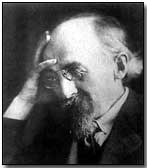 At a local level, Munich had plenty of
home-grown left-wing orators calling for
peace and class revolution (which may explain why the Spartacists had difficulty
in making any political inroads).
At a local level, Munich had plenty of
home-grown left-wing orators calling for
peace and class revolution (which may explain why the Spartacists had difficulty
in making any political inroads).
One of them, Kurt Eisner, was head and shoulders above the rest in terms of popularity. At first glance he was the least likely of agitators. A Berlin Jew who earned a living as a drama editor for a leftist newspaper, he had arrived in Munich in 1907, after a tenure as editor on the major socialist newspaper Vorwarts. He had left the SPD to join the USPD in 1917 when the two parties split.
Eisner resembled, according to David Clay Large, in his excellent book Where Ghosts Walked: "A caricaturist's dream; pale, unhealthy-looking skin; and dark, runny eyes enlarged by a pair of pince-nez glasses."
Balding and bearded, he wore a shabby coat and wide-brimmed large bohemian hat when out and about. To put it colloquially, he appeared more Groucho Marx than Karl Marx. But perhaps it was because he represented the very antithesis of what a 'Bavarian' politician and revolutionary should be that made Eisner a man to listen to. He certainly had a way with words: his speeches were as fiery as they were witty.
It was inevitable that such a flamboyant orator would eventually put a foot wrong. In late January 1918, starving armaments workers followed their Berlin brethren's example by downing tools and going on strike. Out on the streets the crowds gathered and the revolutionaries began to agitate.
The timing was too early, however, for the bulk of Germans believed that the war - with the Russians knocked out by 1917 and with manpower and material rushing West - was still winnable. The strikes petered out and the authorities used the opportunity to round up and imprison the 'usual suspects' of revolutionaries.
Eisner almost certainly topped their list and he was duly incarcerated.
Breakdown
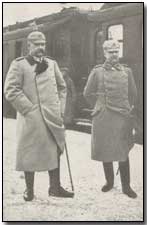 In spring 1918, the Western Front witnessed the opening of Germany's great
offensives.
In spring 1918, the Western Front witnessed the opening of Germany's great
offensives.
Initially, the Kaiser's armies punched great dents into the Allied lines. The first offensive, 'Michael', ground to a halt despite gaining impressive results. The second offensive 'Georgette' did much the same. The final pushes under 'Blucher' took the German army to within large-calibre gun range of Paris.
Although the armies had performed admirably, they had not delivered the promised breakthrough. The German High Command also knew that their halted forces were now in serious trouble. So many soldiers had been lost in the offensives that gaps in the line were becoming impossible to fill.
Although largely shielded from these grim facts, German soldiers were not blind to the looming disaster. Their morale, which had been buoyant to begin with, started to break down, especially when enemy trenches and depots were taken. They could see, and their stomachs could judge, the vast difference between what the Allied soldier received in terms of quality and quantity compared with his own meagre rations.
Many half-starved German troops forgot about glorious advances when caches of food and alcohol were captured. Instead, they stuffed themselves full and drank themselves silly. In fact there were a number of instances when entire units were 'out of action' purely from drunkenness.
Another body blow to German morale came with the realisation that the Allies, far from war weary as the propaganda had suggested, were in fact keener than ever to strike back. Even the lowest rank in the German army realised, especially with America rushing hundreds of thousands of troops to France, that time was not on their side.
Increasing revolutionary agitation within the German army was noticed at this time. Staring defeat in the face, many soldiers believed that they had somehow been cheated out of the victory they had deserved. Numerous targets for this anger were identified - the current army leadership, the socialists, the 'shirkers' in the rear, the factory workers etc.
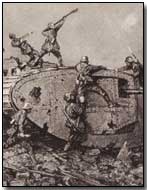 For the men who made up the elite Stormtrooper units, however, the cause of
defeat was laid squarely at all German society.
For the men who made up the elite Stormtrooper units, however, the cause of
defeat was laid squarely at all German society.
The whole rotten structure, they thought, had failed them. Upon their return to home after the war many vowed they would rip the 'deadwood' out of society and forge a new Germany - by bloodshed if necessary.
Munich, in particular, was to learn this the hard way.
Checkmate
Following the checking of the German offensives the Allies launched a vast series of counter-attacks towards the end of summer 1918. Under the relentless pressure of Allied assaults, the German line first bent and then started to buckle.
Towards the end of September, General Ludendorff - the man effectively running the army and, as an extension of this, the country - had a minor nervous breakdown.
On 28 September he had recovered sufficiently enough to realise that total defeat was on the cards. Both he and Hindenburg (the de facto head of the army) agreed to try and open negotiations with US President Woodrow Wilson in the hope that the 'Great Idealist' would grant Germany favourable terms.
The 'negotiations' were undertaken covertly and were doomed to fail. Wilson may have had a large ego, but even he was not narcissistic enough to ride roughshod over the other Allies and secure a separate peace.
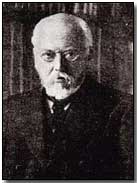 Realising they would have to come to terms with all the Allies all at once,
Germany decided to 'democratise' her government to obtain more lenient terms.
Chancellor
Hertling resigned his post and the position passed into the hands of
Prince
Max von Baden on 3 October. General
Groener, a brilliant
logistician who had earned his reputation on the Eastern Front, replaced
Ludendorff.
Realising they would have to come to terms with all the Allies all at once,
Germany decided to 'democratise' her government to obtain more lenient terms.
Chancellor
Hertling resigned his post and the position passed into the hands of
Prince
Max von Baden on 3 October. General
Groener, a brilliant
logistician who had earned his reputation on the Eastern Front, replaced
Ludendorff.
Baden was a rare example of a German aristocrat with well-documented liberal leanings. Unfortunately he was also the Kaiser's cousin and this fact did not go unnoticed by the Allies.
He began his rule by asking the SPD to join his emergency government and to help the country in its hour of need. Patriotic, but also seeing a chance to obtain their longed-for Socialist goals, the SPD agreed. It was thought the Allies would view the willingness of the SPD to take responsibility for many key administrative and ministerial positions as evidence of Germany's willingness to come to terms.
This may have been the case to some extent. Unfortunately for the ruling elite the Allies were adamant that no deal would be struck with Germany while the Kaiser was still its figurehead. When asked for his crown, however, Wilhelm bluntly refused. And the bull-headed man kept on refusing even when it was clear that his stance was, in effect, the last nail in Imperial Germany's coffin.
End Of An Empire
By late October 1918, Baden was desperate to secure the Emperor's abdication, for unless the war was halted in a matter of weeks then Germany would be crushed both externally and internally. The sooner the armistice was signed, the more could be salvaged from the wreckage of defeat.
On 6 November, to break the impasse and come up with an offer the Kaiser could accept, Baden called in the SPD. With their leader Ebert (a gruff and paunchy man, who was an excellent administrator), he tried to hammer out a solution. Ebert, clutching at straws, suggested that perhaps a Regency could be set up.
Meanwhile, agitation in the factories was at fever pitch and massed strikes seemed moments away. In Kiel, on 3 November, an outright mutiny occurred when the Naval High Command contemplated a 'suicide ride' for the fleet, which had been holed up since Jutland in 1916.
It was an effort by the Command to secure some last minute glory and to combat accusations from land forces that the Navy had shirked its responsibility in the war. Unfortunately for the admirals, honour was the last thing on the minds of ordinary sailors and mutiny soon broke out. After a few confused days, Kiel soon fell into their hands.
The mutiny was eventually calmed by the brilliant realpolitik of Gustav Noske, a tall and thickly built SPD politician, who had been sent by the government to quell the trouble.
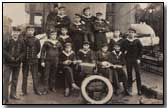 While order returned to the port, many of the
revolutionary sailors left Kiel to spread revolution and discord across Germany:
on 5 November contingents arrived in Lubeck. By the 6th, Bremen, Cuxhaven
and Hamburg witnessed uprisings instigated by newly arrived sailors. On
the 8th whole districts in the North felt the effects of civic disorder as the
sailors dispersed even further across the region.
While order returned to the port, many of the
revolutionary sailors left Kiel to spread revolution and discord across Germany:
on 5 November contingents arrived in Lubeck. By the 6th, Bremen, Cuxhaven
and Hamburg witnessed uprisings instigated by newly arrived sailors. On
the 8th whole districts in the North felt the effects of civic disorder as the
sailors dispersed even further across the region.
On the same day, a group of German diplomats crossed the lines over the shell-torn front to meet with French counterparts and Marshal Foch, the supreme Allied Commander-in-Chief. Sat in a railway carriage, the terms of the armistice were given to the Germans and Foch made it absolutely clear that he was not willing to compromise.
The German armies were to immediately evacuate the occupied territories and retreat beyond the River Rhine. Bridgeheads over the river were to be handed over to the Allies. Germany was informed that its men remaining on the Eastern Front should remain where they were. Until the State of Poland was resurrected they were to act as the barrier against Lenin's Bolshevik Russia.
New Nation
With the Kaiser obstinately clinging to power, and riots and strikes flaring up across the country, Max von Baden realised his position was becoming untenable. On 9 November the SPD felt that it had to withdraw its support of the government, rightly fearing that being connected to Baden and the defeat was damaging its own support-base.
Ebert arrived at Baden's office to inform him of the SPD's decision, leaving the chancellor no other option but to pass power to the socialists. It was either the SPD or anarchy.
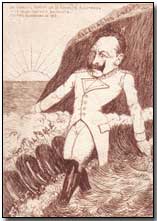 Philipp Scheidemann (Ebert's deputy) announced a German Republic to the waiting
crowds outside the Reichstag who spent all day calling for von Baden to go.
Ebert was angry when informed of Scheidemann's declaration - how, Ebert asked,
could he be the Imperial Chancellor of a democracy?
Philipp Scheidemann (Ebert's deputy) announced a German Republic to the waiting
crowds outside the Reichstag who spent all day calling for von Baden to go.
Ebert was angry when informed of Scheidemann's declaration - how, Ebert asked,
could he be the Imperial Chancellor of a democracy?
He need not have worried, however, as the last thing on the average German's mind by this stage was constitutional complexities. An emergency cabinet was established and after deliberation an election date for a free and democratic assembly was set for January 19.
Meanwhile, Kaiser Wilhelm was finally given the push. Informed that the Army could no longer maintain its oath of allegiance, Wilhelm was bundled onto a train and sent to Holland for a life of exile.
Next - Gathering Storm
'minnie' was a term used to describe the German trench mortar minnenwerfer (another such term was Moaning Minnie).
- Did you know?

